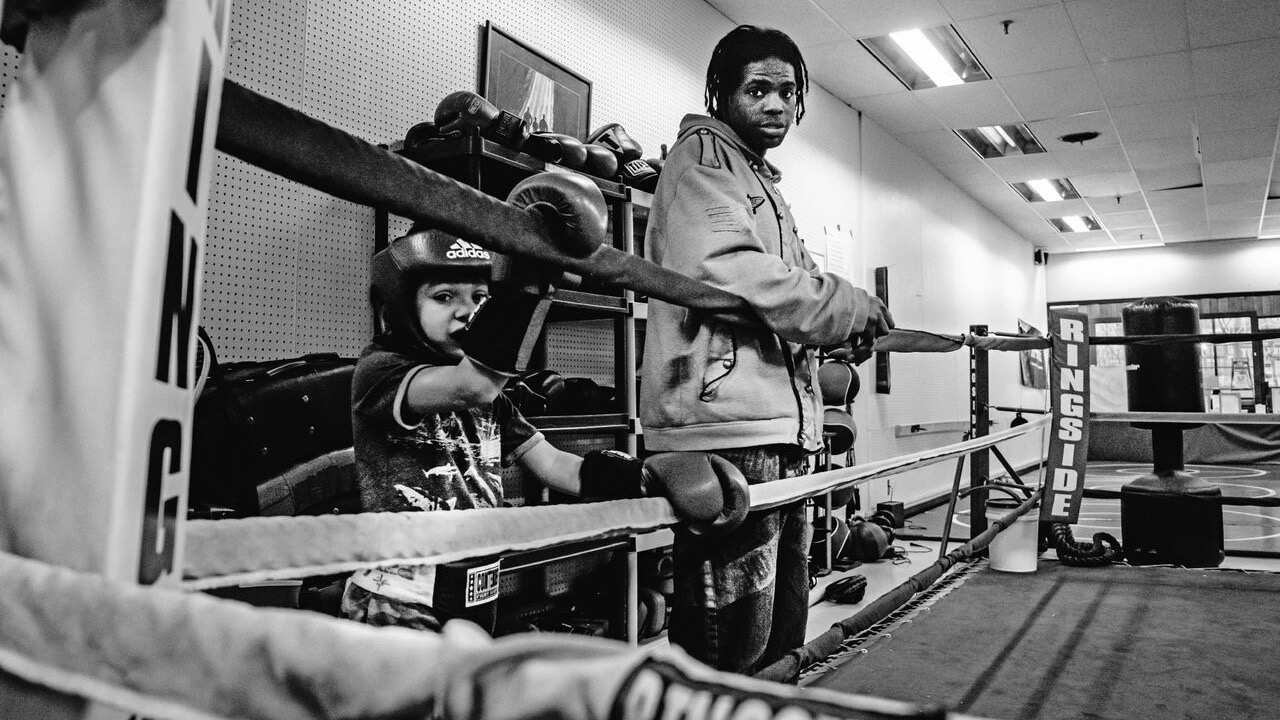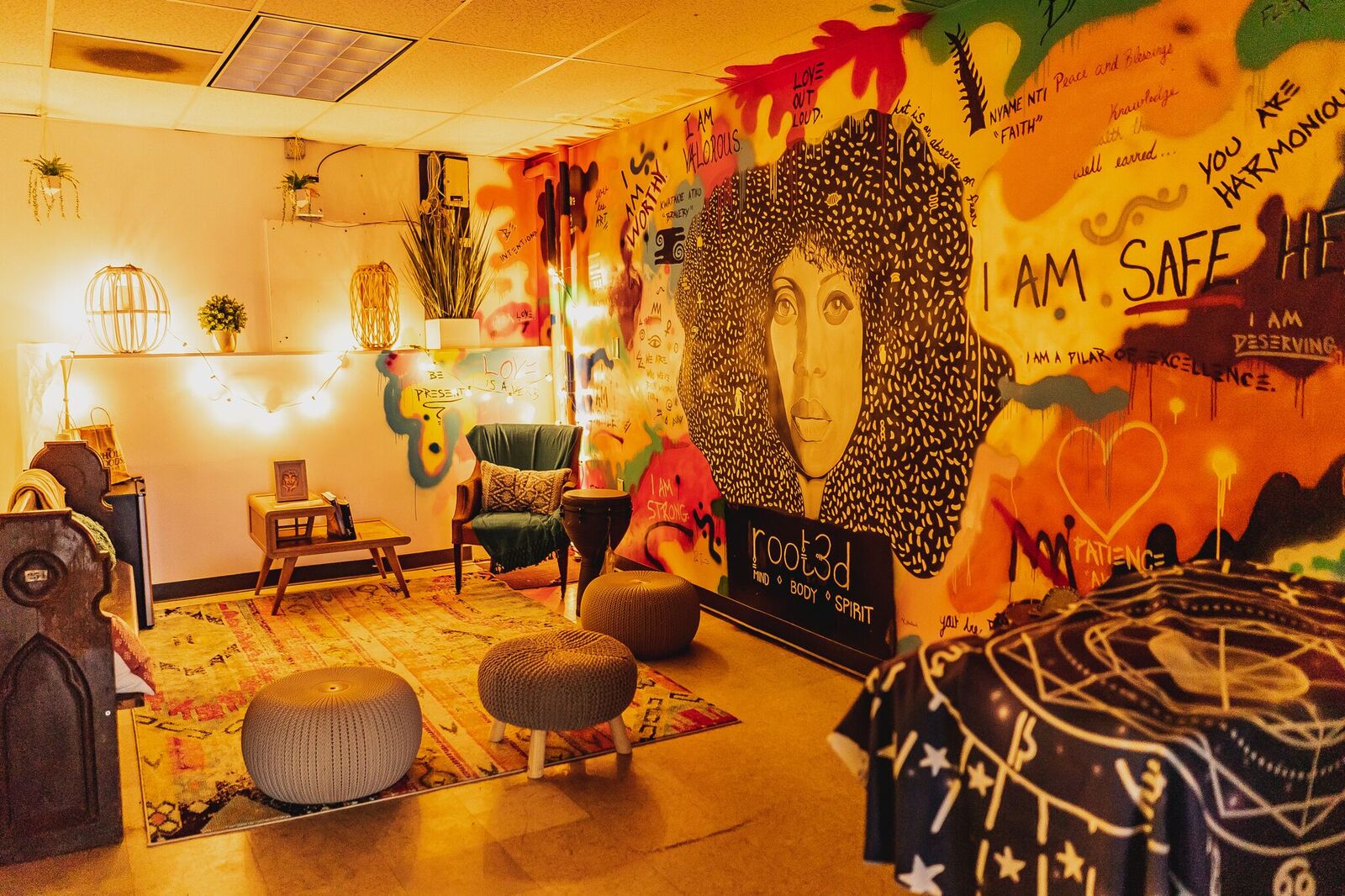Photos by Kiki Vassilakis
“Wake up!” Coach Vincent Kittle is hiding a slight smile, staring intently at a young man in sweats who has just languidly walked into the gym. “You can start your training right here,” Kittle says–a bit gentler now–as the teenager shuffles his way towards the row of treadmills and attempts to untangle his headphones.
It’s 4 PM at the Ring of Hope boxing gym in Schenectady and kids are everywhere. It seems that Kittle, the gym’s founder and head coach, has an eye on each and every one, commenting on their training and keeping them moving. A half dozen kids, ranging in ages from 8 to 14 years old are on the floor of the boxing ring doing conditioning cycles. They scissor kick on their backs as their coach Ben Wright stands over them counting, playfully pushing one trainee’s legs to set him off balance. A few scattered adults and high school-aged kids are at the weights station, some practice their jabs at the heavy bags.
Coach Kittle opened the nonprofit gym over 10 years ago to share his love of boxing and the positive effects it has on the self–from weight loss and strength training to critical thinking and discipline. And he’s got some impressive credentials to boot. Kittle started his career in the U.S. Marine Corps after discovering that the members of the boxing team were exempt from infantry duties. After making the team, Kittle made an important self-discovery: He was good at this. Kittle won the All-Marine Corps championship in 1983 and moved on to take silver in the All-Service championship. He then made it to the 1984 Olympic East Regional tournament. After leaving the service, he continued his amateur boxing career back in his hometown of Albany at the Trinity Institute Gym in the South End. When his trainer Matt Baranski was offered a position as Mike Tyson’s cut man (the crude but highly respected responsibility of treating the bleeding and swelling of a boxer’s face during a match), he asked Kittle to take his place as a trainer. “I was more than happy to take over and I’ve been doing it ever since,” Kittle says.
After successfully running the Albany gym, he decided to branch out with some financial help from local real estate broker Jeff Christiana in 2006.
“I was looking for someone to partner with in opening a gym for a long time,” Christiana says. The gym’s chairman of the board of directors has a background in karate and recently “retired” from teaching adult classes at Ring of Hope where additional jiu-jitsu classes are taught by John DiCaprio, Chad Dukes and Adelphos Rivera. Previously, Christiana taught American-style Uechi-Ryu at Albany Okinawan Karate School. When he found Kittle, the business partners purchased a building on Albany Street in Schenectady and set up shop before moving to their current location in Crosstown Plaza, where they will be for the next three months before having to find another space. The Lupe family-owned and operated plaza is under new ownership and the accompanying rental agreement is unmanageable for the nonprofit gym.
“The Lupe family has been very kind to us, they understood the work that we do,” Christiana said. While the board is considering two offers for a new location, there is no word on where that would be just yet.
“I think there’s more than enough troubled kids that there should almost be a gym on every corner,” Kittle says. “There’s plenty of kids. You open your doors, show ‘em some love and have a working system and they’ll show up. Absolutely.”
Every day, dozens of local kids find their way to the Crosstown Plaza gym after school to train, socialize and blow off some steam. Students from Central Middle School and Schenectady High School can attend for no charge. Adults and other local amateur boxers that come to train pay a small fee. “That allows us to do what we do for these kids and keep the lights on,” Kittle says.
Boxing provides a positive outlet for the kids that is just as much about their mental strength as it is physical. “One of the biggest things that we get is parents that are looking for some help with discipline or with weight loss or with self-control,” Kittle says.
The art of the sport is the reliance you have to have in yourself to become a success. It’s something the gym’s founder has put all of his faith into.
“The one thing about it is that when you get in the ring, it’s just you and the other guy. And all of the things that have been in you, what you’re going through, they help you or they show you that you need to do more of. You’re either going to extremely successful using the techniques that you’ve learned or you’re gonna realize that you didn’t work as hard on the techniques as you needed to. At any rate, the technique is correct. That didn’t fail you, you just didn’t do enough of it. I use the analogy that you have a toolbag and each day, we’re going to work on a specific tool. We’re gonna take it out, we’re gonna tune it up and we’re gonna place it back in that bag and you’re gonna carry that bag for the rest of your life. And you’ll be able to resort back to certain skills and certain techniques that you’ve learned and that you’ll need. I’m a big believer in that. There’s only four or five punches that you can actually throw in boxing so why is your jab better than my jab? Because I’ve gotten in over ten million jabs to match up with your five thousand. It’s redundant in a lot of ways but it’s the only way to get better.”
So when the kids come in to train, they train hard. The gym is constantly ringing with their efforts, from the constant whirring of a jump rope and the abbreviating exhales of the sparring partners in the ring to the heavy thudding jabs coming from a rather unexpected deliverer–a 7-year-old clad in hot pink sweatpants and swinging pigtails. She has a pretty brutal punching rhythm down.
Since the start of Ring of Hope, Kittle’s training career has produced more than a few professionals (“People who went from knowing absolutely nothing about boxing to having a professional boxing career.”) such as the up-and-coming heavyweight Trevor Bryan. The coach has also brought up successful amateur-level boxers, such as Jah-yae Brown and Nasir Mayfield, who became silver gloves national champions in 2015.
As a nonprofit, the gym operates solely through fundraising to support their students and programming. Their latest fundraiser–a night of opera music with Tenor Angelo Mazzone–will take place on April 13 at Proctors. The funds will go towards basic operations as well as special projects, such as covering the costs of higher education courses for kids who are interested in pursuing a degree, but can’t afford to do so.
The most successful project to come from the gym is the Peaceful Warrior scholarship. In collaboration with Schenectady High School, the donation-based scholarship provides its students with the necessary equipment and transportation for competitive boxing. Led by the school’s social worker Nathaniel Wylie and psychologist Rafael Medina, the project aims to teach the high school students self-discipline through the art of boxing with “pillars of success” in increasing school attendance, positive behavior and academic responsibility. “It’s really been a labor of love,” Christiana says. “We’re trying to reach one person at a time.”
While attendance has been down this year, Christiana says the program has been life changing for the students of Schenectady. “Like any project, the amount of kids turn over every few years. We usually start with 25 to 30 kids and eight to 12 of them will stay throughout the year. At least one to two of them will come out as A and B students but all of them will change in terms of attendance and grades.”
The program has been a great source for getting more kids into the gym, says Kittle’s niece Carmen Charleston. “We have kids who start from there who really like it and want to continue here.”
The scholarship–and the overall attitude of the gym–promotes family health, community involvement, social issues awareness, drug-free lifestyles, and violence prevention. One of the biggest vices the sport combats is smoking, a lifestyle change Coach Kittle made at the start of his own career with the Marine Corps boxing team.
“I used to smoke Newports. When I went down and I saw my name on the list, I took my cigarettes and threw them away. Never had another again. Didn’t need any patches or anything. I knew I wanted to be a part of that team and I haven’t smoked since. To me, it had to be one or the other,” Kittle explains. For student after student, the dedication to the high-intensity cardio workout wins over cigarettes and marijuana. It’s a significant impact, but it’s one that Kittle humbly shrugs off.
“It’s effortless. It’s not something that we brag about or something that we say that we do, because you can’t do both. You can’t be a smoker and do this sport. Won’t work.”
Watching the inhabitants of the gym in their constant action, that’s easy to believe.
After a short warm-up, trainees make their way through each equipment-packed “station” of the gym, moving to the sound of a shrill beeping alarm on the wall. Every two and a half minutes, a green light clicks over to yellow, signifying the final 30 seconds to power through a set before landing at red. “It a lot,” says Charleston. “If your jump-roping you can stop until those three minutes end.” At the sign to move on, a jump roper will head to an unmanned heavy bag, double-end bag, speed bag and begin their piston training (non-stop punching) or shadow boxing. “When it comes to conditioning, this is one of the toughest sports out there,” Kittle says.

The Ring of Hope Boxing gym may look small-scale in Schenectady, but the coaches work hard to expose their students to out-of-state and national competitions. At a local level, this Memorial Day weekend they will be hosting the 2017 Regional Junior Olympics at Schenectady High School. Boxing teams from upstate New York as well as New Jersey, Connecticut and other northeastern states will compete and the winners will advance to Nationals in West Virginia. “It’s great because it gets them traveling. We take care of getting them there. It’s hard but we get it done,” Kittle says. The road trips aren’t just useful for getting the kids out of town for a spell, but provide a window of opportunity to discuss the problems kids face outside of the gym setting.
“It’s mentoring of each other. That’s where the dialogue comes in and it’s really interesting to just drive and listen. You’d be surprised, we have some really intelligent young people here. They’re very, very encouraging. They get it, and they get it from each other and that’s what’s valuable.”
This kind of dialogue happens more often than not during training sessions where the high schoolers are given the time and space needed to explore their day-to-day issues. When the conversations escalate or reach a standstill, the coaches are the tiebreakers with plenty of varying perspectives and experiences. Coach Marc La Fleche is a school teacher, Coach Kittle worked as a security officer in the Albany school district in security for 18 years, Coach Ben is a college student and their latest addition is a gym alum who is currently attending Bible college.
“At that point you have to be prepared to have an opinion and we’re all extremely different but we all have something to offer and that helps us be the organization that we are,” Kittle says.
The trust that the kids have placed in one another is what Kittle explains as the greatest result to come from the boxing community. The coaches and mentors have no need to drill a moral agenda into these kids, they’re doing it themselves. The gym is a safe space and–thanks to its members–continues to operate that way on a daily basis.
“People can leave or misplace some really expensive items here and they’re always here when they come back–and that’s a rarity in this kind of environment. We’ve just been extremely blessed in that it’s like family. You don’t take from family. Everybody does a really great job of respecting each other.”
The coach adds that this sense of responsibility and respect doesn’t have to stay at the gym. “If you can do it here, you can do it at home,” he says. “That just kind of sinks in after a while. Why is it that I can pull my trousers up and tighten them up when I’m at the gym but when I go to high school, I loosen ‘em up again? You have to stop and think about that. Why is it that I don’t use profanity when I go to the gym, why is it that I can pick up behind myself?”
At the coaching level, the mentors have taken the stance that it’s all about presenting positive lifestyle choices that might be attractive to the kids. By showing them alternatives, the coaches teach their students the importance of independence over expectation.
“A lot of times it’s not what you say, it’s what you do. Like, ‘hey when we go out of town all the other coaches go and get a cocktail, I’ve never seen coach do that,’ or just living a decent lifestyle and making that visible to them.”
Sometimes ideals clash and kids aren’t ready to leave conflicting lifestyle choices and affiliations behind. But one way or another, they always return to the gym.
Nearly an hour into training, another student comes into the gym and stands in front of his coach, awaiting instructions. “Get your workout partner, let’s see if we can get two in today, alright?” Kittle is quick, always ready to put his boxers to work. The young man is joined by another, hot off the treadmill. “Relax, take a deep breath and then hit the road, Jack. Give it a shot.” Before they can protest, they are sent off running laps around the plaza.
“Gotta keep ‘em moving. Keep ‘em on their feet, keep it fun. At the end of the day, they’ll have been moving for two hours,” the coach explains. He continues to stare out of the empty doorway of the gym. “The one out there running hasn’t been here. He just came back probably two weeks ago, hasn’t been here in a year. They all come back, and as adults too, to show off their families or to say, ‘Hey coach I told you I was gonna make something of myself, look at me now.” They’ll tell me about their job, talk about which school they’re attending. They all come back.”
Out of everything, says Christiana, “Coach really appreciates that.”





